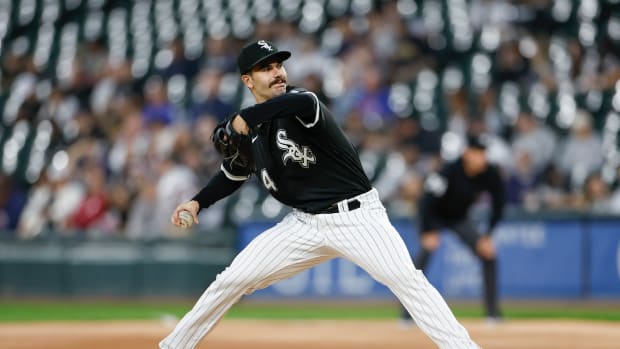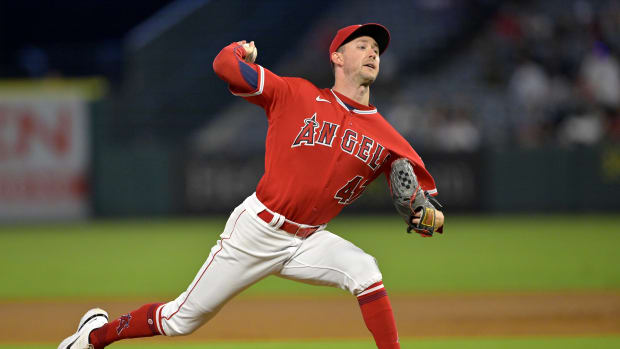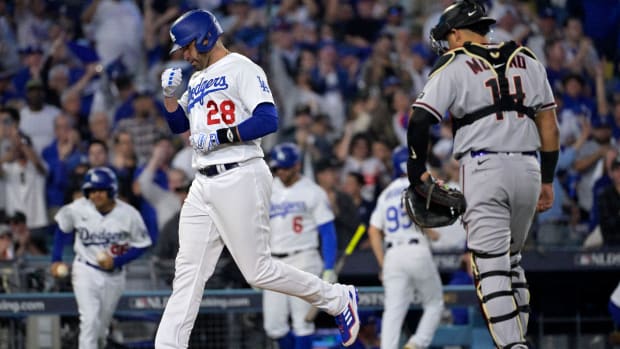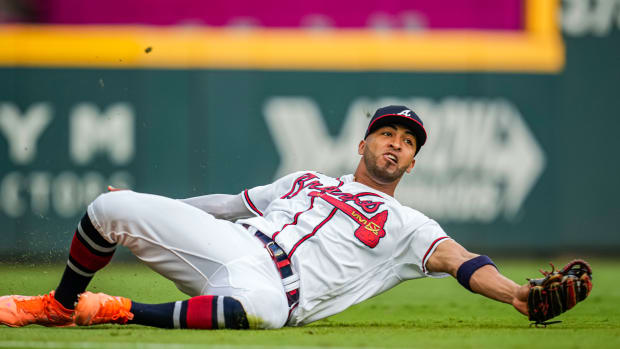World Series preview
The Phillies played very well in the NL postseason, but there's no way to avoid the fact that had you seeded the playoff teams 1-8, the Brewers and Dodgers would have been 7 and 8 in some order. That's how you can go 7-2 with Ryan Howard slugging .323, among other so-so performances. The Phillies shut down their opponents to get here, allowing a little more than three runs per game. That's not likely to continue.
One entertaining aspect of this matchup is that we have two teams that steal bases very well, but that get their offense from power rather than speed. The Rays have gone 17-for-19 on the bases after leading the AL in steals, but their offensive strengths are walks and, with 22 bombs in October, home-run power. The Phillies have famously been the best basestealing team in history, successful on 86 percent of their attempts over the last two seasons. But they also led the NL in home runs and were second in slugging. You cannot put either of these teams in a box.
In terms of the lineups, Phillies manager Charlie Manuel will sometimes use Shane Victorino in the No. 2 spot of his lineup and Jayson Werth sixth. He will also sometimes split Chase Utley and Howard by using Werth between them. While he has eschewed doing so in the postseason, the tactic is almost mandatory in this series. The Rays, with the emergence of David Price, have three effective left-handed relievers. Utley slips against southpaws, while Howard collapses. Manuel has to make Rays manager Joe Maddon work harder by not batting them back-to-back. If he doesn't, the two will rarely see a righty in any leveraged situation. This is a key element in this series.
One key difference between the two teams is how much the Phillies' lineup falls off at the end. The Pedro Feliz/Carlos Ruiz duo provides an escape hatch for most pitchers, with Feliz being a hacker who occasionally runs into a fastball, and Ruiz a singles hitter with minimal power. Both are significant double-play threats, so look for Victorino to run if he gets on in front of the bottom of the lineup. Greg Dobbs occasionally plays third base against right-handers, but not all right-handers; Manuel seems to prefer using him when his own starter is right-handed as well. The Phillies need his bat in the lineup.
Now, unlike a number of recent NL entrants, the Phillies actually have a pretty good DH option. It should be Matt Stairs, although it might be Dobbs against right-handers. Against Rays lefty, and Game 1 starter, Scott Kazmir, Philly can DH Pat Burrell and use Eric Bruntlett or So Taguchi in left field. That's a much weaker choice than Stairs or Dobbs. The Phillies, as a team, were stronger against lefties than righties this season, but with Utley and Howard's splits, and the gap at DH, Kazmir and the southpaw relievers seem like a good matchup.
The Rays will platoon Gabe Gross and Rocco Baldelli in right field, and Cliff Floyd and Willy Aybar at DH. Other than that, it has been a set lineup since Carl Crawford returned and dropped into the No. 5 slot. The Rays' speed in front of the bottom of the lineup is a nice touch. They do steal bases well -- an AL-leading 142 at a 74 percent clip -- and have the ability to use their speed to stay out of double-play situations in the bottom of the lineup, which features slow groundball hitters. This keeps the offense going.
The Rays beat the Red Sox in part because they went a bit nuts at the plate, hitting 16 homers and slugging .508. That's a bit outside their range, but the Phillies' starters do get the ball in the air and allow their share of home runs, while their relievers have had an odd year with respect to their HR/FB rates, which were very low. It would not be surprising, and in fact, it may be a key to the Series, if the Rays were to continue bashing their way through October.
The Phillies' bench is not a strength. They have virtually no speed or defense, and their backup catcher is about the third-best hitter there. Bruntlett emerged as the defensive replacement for Burrell, leaving Taguchi as a fifth outfielder with no discernable reason for his roster spot. He and Geoff Jenkins would have made a nice platoon a couple of years ago; now they hit for pitchers, and maybe for Ruiz, and even "hit" is inappropriate. Dobbs is an effective pinch-hitter, although he should be starting, and Stairs will be on the bench about half the time.
The Rays have a bit more flexibility. Floyd and Gross are the other halves of platoons, but Fernando Perez has emerged as a pinch-runner with significant tactical value, and he might be the best defensive right fielder on the team. Ben Zobrist won't play much, but as a switch-hitter with a little pop he gets called on occasionally to hit for Bartlett or Gross, and his ability to play the outfield has given Maddon some in-game options. Hernandez is trying to get a ring on the Chris Turner Plan.
The decision to flip Kazmir and James Shields in the ALCS rotation costs the Rays now, as they can't go with Shields in Game 1 against Cole Hamels. They have yet to announce their rotation, but there's no reason for them not to just run Kazmir out there, followed by a rested Shields and Matt Garza. Kazmir has his command issues, but a power left-hander isn't a bad idea against the Phillies. The Rays have gotten very good starting pitching in this postseason, with Garza the breakout star off two excellent outings against the Red Sox. If there's a concern, it's that everyone but Garza can be beat with the longball. That Game 4 matchup of Andy Sonnanstine and Joe Blanton looms as a long night in Philadelphia.
For the Phillies, it's really all about Hamels. The lefty has three of the team's seven wins in October, and he hasn't been challenged in any of them. For the Phillies to win the World Series, they'll need to win both of his starts. In fact, were I in charge, I'd push Hamels to 1-4-7 and either drop Blanton from the rotation or use him in Game 5 and put Myers in the bullpen after his start. The gap between Hamels and every other Phillies' starter is large, and the gap between Hamels and Blanton, given the Rays' team platoon split, is massive. If the Rays beat Hamels even once, they should win the Series handily. This makes Game 1 even more significant than it already is.
The Phillies' full set of lefty relievers could come in handy, as a redundancy in lefty specialists that was overkill in the NLDS and moderately helpful in the NLCS becomes a feature in the World Series. James Happ is more of a long reliever for low-leverage situations, but the ability to turn a lineup around if you fall behind 4-0 in the third has its benefits. Brad Lidge, of course, is the story here, perfect in save situations in 2008 on the strength of allowing just two homers all season long. If you're tired of that note, consider this one: Lidge walked 31 men unintentionally in 69 2/3 innings, a very high rate for a closer. There's no way around it; when he comes in, Phillies fans are going to be nervous, because his combination of free passes and fly balls is scary. All the Phillies relievers, save Ryan Madson and Scott Eyre, are prone to walking the park, and the Rays are as patient as they come.
We've seen the Rays' bullpen in action, and it's a very good one, with power arms missing bats, two effective tactical guys and now David Price. It's not clear how Maddon will use Price in the Series, although given the importance of his last two appearances, it seems fair to say that Maddon is comfortable with his rookie in high-leverage situations. If Price supplants Dan Wheeler as the closer, that's probably a good thing. Wheeler may move into Grant Balfour's spot, at least at the beginning of the Series; Balfour pointedly did not pitch in Sunday's Game 7, on the heels of a couple of rough outings. He's still the biggest strikeout threat in the pen, and would be an overpowering reliever against the bottom of the Phillies' lineup. The Rays' pen, on the whole, has a considerable advantage in this series, maybe their biggest one.
Let's not let a few high-profile mistakes drive the story; the Rays were one of the best defensive teams in baseball in 2008, and remain so right now. We saw some flaws close up over the last couple of weeks. Evan Longoria can get sloppy on his throws; B.J. Upton tends to drift, rather than run, back on fly balls; Gross isn't a fast man. Still, the Rays don't let you beat them on balls in play. Gross' metrics aren't bad, but Perez or Baldelli should be in right field late in games.
The Phillies were also strong defensively, sixth in the majors in Park-Adjusted Defensive Efficiency. Their highs are higher and their lows lower than the Rays'. Utley is a fantastic, if unheralded, second baseman; Victorino is excellent in center and while I'm no Pedro Feliz fan, he is a very good glove man at third. On the other hand, no Ray is as bad anywhere as Howard is at first base, and Burrell is below-average in left field. Neither team has an overall edge here, although if I had to pick, I'd probably take the Phillies' defense because of Utley's skill.
Maddon is entertaining, and I think the one thing you can say for him is that he's not going to get tied down to roles. That was Mike Scioscia's defining trait at the start of his career as well. Maddon used Balfour and J.P. Howell in the fifth inning of Game 2 of the ALCS. Price went from an extra guy in the bullpen to the man he chose to save his season in Game 7. Wheeler was asked to get 10 outs in Game 2. That kind of flexibility is admirable. However, Maddon has occasionally sat on his hands in the wrong spots, passing up a chance to gain an edge. I suspect we're seeing a learning curve here, and a very steep one, so there's always the chance that Maddon will make a mistake along the way with the 'pen. Otherwise he's a very good manager, not overly enamored of smallball, and by all accounts, he's good at the off-field stuff.
I mentioned earlier in the postseason Manuel was growing on me. The refusal to separate Utley and Howard in the lineup is grating, as is the refusal to play Dobbs more often. Outside of that, though, he runs his pitching staff well, even using Lidge for four outs for the first time all year because the situation warranted it. There was one massive gaffe in the NLCS, asking Victorino to bunt in a clear swing situation. That seems to reflect less an affinity for one-run strategies as an inflated opinion of the bottom of his lineup. That's not fatal.
Both of these guys are assets, and the only thing I'd note is that Maddon might be more likely to make a costly mistake. He is the man who issued a bases-loaded intentional walk during the season and let David Ortiz face a right-hander in a few critical situations last week.
For all of the detail above, I keep coming back to one point: The Rays are a much better baseball team than the Phillies are. The gap between the leagues is real, and when you adjust for it and other factors -- as third-order wins do -- you find that the Rays were actually 10 games better than the Phillies this season. They've also beaten better teams to get to the Series. Compare the rosters, and while the Phillies have their share of frontline talent, perhaps even more than the Rays have, the Rays have almost no dead spots on the roster, and are much stronger toward the bottom of the lineup, the back of the rotation, the bullpen and the bench.
Three of the last four World Series have been AL sweeps. The presence of Hamels makes that result unlikely, but even he won't be enough to save the Phillies. Rays in six.


































